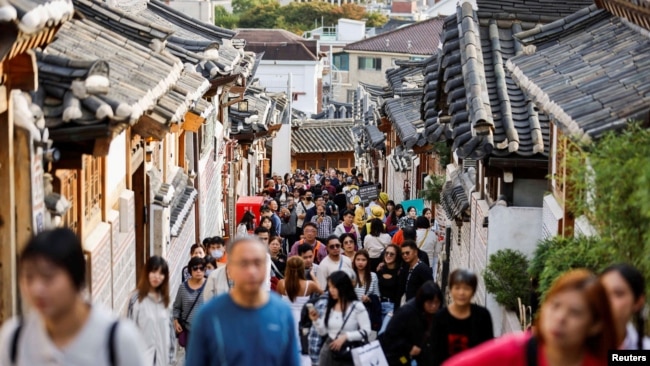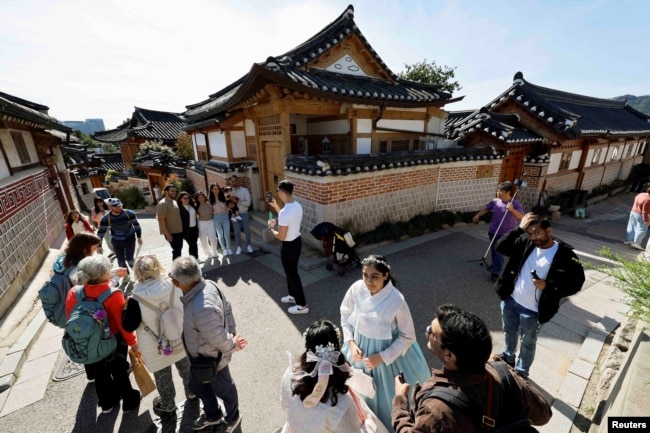本当に美しい街並みですね♡
韓国には何度か訪れています、参鶏湯の美味しいお店が韓国の昔の家屋で感激しました。ここには行ったことがなくて、残念!!
Traditional Seoul Village Hopes Curfew Brings Back Normal Life
In South Korea’s capital of Seoul, Bukchon Hanok Village’s narrow winding alleyways date back hundreds of years to the Joseon Dynasty. The area has become a popular place to visit, especially after appearing in a television show about 10 years ago.
Foreign visitors and Koreans visit the neighborhood to see houses with wood columns, courtyards and tiled roofs.
The area attracted about 6 million visitors last year while the population of the area is around 6,100.
However, increasing numbers of visitors have become a problem for people who live there. They complain about noise, trash, bad behavior and invasion of privacy.
Some visitors have been caught on camera trying to enter private homes or looking inside without permission, creating conflict with locals.
Many local people have chosen to leave, leading to a 27.6 percent drop in the village's population over the past 10 years.
Village officials now want to set a curfew in the area. The curfew will limit visitors to certain areas of Bukchon from 5 p.m. to 10 a.m. local time. It will start as a trial in November and will be officially launched next March. Violators could pay fines of up to $72.
Chung Moon-hun is the head of Jongno district. Chung said the goal is to protect the rights of local people. Chung said the curfew can be changed if necessary to make it more effective. The area where curfew hours and fines will be in effect is about 34,000 square meters. That is about the size of five soccer fields.
Kwon Young-doo owns the private Asian Cultural Art Museum in Bukchon Hanok Village. Kwon is concerned about the curfew policy aimed at preventing visitors from overrunning the area.
"Who would want to visit?" asked Kwon who moved into the historic area 18 years ago. "They'll leave with a bad impression of South Korea."
Others do not believe the policy will be effective. They note measures such as exemptions for visitors staying overnight in traditional houses called hanok. Many of these hanok are now owned by businesses after officials loosened restrictions on overnight stays.
"People come for just a day to enjoy themselves, and the noise from parties is extremely loud," said Kim Eun-mee, who lives next to a hanok. Clearing trash in front of her home has become a task she has to perform several times a day.
"It's often difficult to maintain a normal daily routine due to disturbances.” She said people often make noise moving their suitcases around even in the early hours, which wakes her up.
Lee Dong-woo is head of the website BUTLER.LEE which is used to rent the hanoks. Lee said the business grew when owners who found it difficult to modernize or maintain old houses turned them over to businesses.
"These requests are driving the expansion, not because we are actively evicting current residents to operate hanok stays," Lee said. Lee oversees 17 hanok stays in Bukchon.
Visitors are divided over the curfew. Some agree locals’ quality of life is important. Others are unhappy at the idea of getting fined for simply walking down a public street.
There are also questions about how the rules will be enforced; how to tell visitors from locals; how to make foreigners pay a fine, and how to deal with the language barrier.
Words in This Story
dynasty –n. a group of associated rulers who govern a country for a long time
column –n. a circular or square support for a building
courtyard –n. an open area surrounded by buildings
roof –n. the top of a house that protects the inside from rain and sun
trash –n. waste and unwanted materials
trial –n. a test
exemption –n. freedom from having to observe a rule that everyone else must follow
routine –n. something that is done regularly as a normal part of a day or week
disturbance –n. a happening that is loud, surprising or that causes people to change what they would normally do
evict –v. to remove someone from where they normally stay or live
ソウルの伝統的な村、夜間外出禁止令で普通の生活を取り戻したい(和訳)
韓国の首都ソウルにあるブクチョンハノクビレッジ北村韓屋村の曲がりくねった細い路地は、数百年前のジョンソンダイナスティ朝鮮王朝Dynastyにさかのぼります。10年ほど前にテレビ番組で紹介されたのをきっかけに、人気の観光スポットとなりました。
外国人観光客や韓国人は、木造の柱columns、中庭courtyards、瓦屋根tiled roofsの家々を見るためにこの地域を訪れます。
この地域の人口は約6,100人ですが、昨年は約600万人の観光客が訪れました。
しかし、増加する観光客はそこに住む人々にとって問題になっています。騒音、ゴミtrash、素行の悪さ、プライバシーの侵害などです。
中には、許可なく民家に入ろうとしたり、家の中を覗き込んだりする訪問者がカメラに収められており、地元の人々との対立を生んでいます。
多くの地元住民が村を去ることを選択し、過去10年間で村の人口は27.6%減少しました。
村当局は現在、この地域に夜間外出禁止令を出したいと考えています。この夜間外出禁止令は、ブクチョンの特定の地域への訪問者を現地時間の午後5時から午前10時まで制限するものです。11月に試験的as a trialに開始され、来年3月に正式に開始されます。違反者は最高72ドルの罰金を支払う可能性があります。
チョン・ムン-フン氏は鍾路区の区長です。チョン氏は、地元住民の権利を守ることが目的だと述べています。チョン氏は、夜間外出禁止令をより効果的なものにするため、必要であれば変更することができると述べます。外出禁止時間と罰金が適用される地域は約3万4,000平方メートル。これはサッカー場5面分の広さです。
クォンヨン-ドゥ氏はブクチョンハノクビレッジ北村韓屋村にある私立アジア文化美術館のオーナーです。クォン氏は、観光客の乱入を防ぐことを目的とした夜間外出禁止政策を懸念しています。
18年前にこの歴史地区に引っ越してきたクォン氏は、「誰が訪れたいと思うだろうか?」と尋ねます。「彼らは韓国に対して悪い印象を持って帰ってしまうでしょう。」
また、この政策が効果的だとは考えていない人もいます。彼らは、ハノク(韓屋)と呼ばれる伝統家屋に宿泊する観光客に対する免除措置exemptionsなどに注目しています。これらのハノク(韓屋)の多くは、当局が宿泊の制限を緩和した後、現在では企業が所有しています。
「人々は1日だけ遊びに来るのですが、宴会の音が非常にうるさいのです」とハノク(韓屋)の隣に住むキム・ウンミさんは言います。「家の前のゴミを片付けるのは、一日に何度もやらなければならない仕事になりました。
「騒々しさdisturbanceのせいで、普通の日常生活daily routineを維持するのが難しくなっています。」早朝にもかかわらずスーツケースを動かす音を立てる人がよくいて、それで目が覚めてしまうのだと彼女は話します。
イドン-ウ氏は、ハノク(韓屋)をレンタルするためのウェブサイトBUTLER.LEEの代表を務めています。イ氏は、古い家屋を近代化したり維持したりするのが困難だと感じた所有者が、それを事業者に譲渡したことで事業が拡大したと語っています。
「このような要望が事業拡大の原動力になっているのであって、ハノク(韓屋)ステイを運営するために現在の居住者を積極的に立ち退かせevictingているわけではありません」とイ氏は言います。イ氏はブクチョンの17のハノク(韓屋)を監督しています。
夜間外出禁止令をめぐって、観光客の意見は分かれています。地元の人々の生活の質が重要だという意見もあります。また、公道を歩くだけで罰金を取られることに不満を持つ人もいます。
また、ルールがどのように施行されるのか;観光客と地元の人々をどのように見分けるのか;外国人に罰金を払わせる方法、そして言葉の壁にどう対処するのか、といった疑問もあります。

